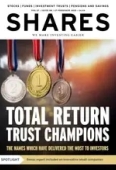Archived article
Please note that tax, investment, pension and ISA rules can change and the information and any views contained in this article may now be inaccurate.
No easy way back for embattled B&M

Struggling discounter B&M European Value Retail’s (BME) stock plunged to a five-year low after the variety retailer delivered its latest profit downgrade (24 February) and announced chief executive Alex Russo would step down at the end of April.
Profit warnings almost always put a dent in a company’s stock price, but the sheer magnitude of B&M’s value destruction over the past year and a bit is alarming and signals investors are braced for more bad news.
The cut-price groceries-to-general merchandise seller carries a significant debt load, so could an ordinary dividend cut be on the way?
Panmure Liberum believes debt levels ‘remain fine’ at one times EBITDA (earnings before interest, tax, depreciation and amortisation) and does not see a risk of a cut despite recent negative trading.
That said, the broker concedes the departure of the chief executive and long-standing trading director Bobby Arora, who has masterminded B&M’s stock buying, in the same year ‘may be a concern for some’.
Russo, who succeeded Bobby’s brother Simon Arora in the second half of 2022, was meant to steer the discounter to greater things, but the market has lost faith in his leadership amid a puzzling slowdown in growth.
Consumers are feeling the pinch from inflation and higher interest rates, which should play to B&M’s strengths, but like-for-like sales have been negative for three consecutive quarters, a trend which is clearly worrying the market.
Full year 2025 adjusted EBITDA is now expected to be in the £605 million to £625 million range, warned B&M.
That’s down from the £620 million to £650 million guidance given with its Christmas update on 9 January and the £620 million to £660 million range provided at the half-year results on 14 November.
The variety retailer blamed the latest downgrade on weak current trading, an ‘uncertain economic outlook’ and the potential impact of currency volatility on the valuation of its stock and creditor balances.
However, Shore Capital scribe David Hughes believes like-for-like declines are ‘at the core’ of the FTSE 250 retailer’s challenges.
The dispiriting news is that ‘with the grocery market remaining highly price-competitive (see the recent re-launch of Asda’s rollback scheme and Tesco and Sainsbury’s successful loyalty price schemes) we expect it to remain challenging for B&M to maintain its price differential while returning to like-for-like growth,’ warns Hughes.
Analysts at Jefferies suggest B&M’s disappointing update ‘must infer the improved December/January like-for-like trend that was repeatedly highlighted last month has not been sustained’.
‘The change in CEO is of limited surprise,’ they add, given the group’s ‘consistent over-promising on profit delivery and a like-for-like trend which was both weak and unexplained.’
Important information:
These articles are provided by Shares magazine which is published by AJ Bell Media, a part of AJ Bell. Shares is not written by AJ Bell.
Shares is provided for your general information and use and is not a personal recommendation to invest. It is not intended to be relied upon by you in making or not making any investment decisions. The investments referred to in these articles will not be suitable for all investors. If in doubt please seek appropriate independent financial advice.
Investors acting on the information in these articles do so at their own risk and AJ Bell Media and its staff do not accept liability for losses suffered by investors as a result of their investment decisions.
Issue contents
Feature
Great Ideas
News
- Rentokil has a long way to go to catch up with US peer Rollins
- Centrica shares hit fresh 12-month high despite normalised trading
- German election result promises continuity as the centre holds
- Why Brown-Forman investors are in need of a stiff drink
- No easy way back for embattled B&M
- Buffett keeps his powder dry as Berkshire Hathaway’s cash pile tops record $134 billion
- Glencore slips to multi-year lows on weak coal price as it mulls London exit
 magazine
magazine








